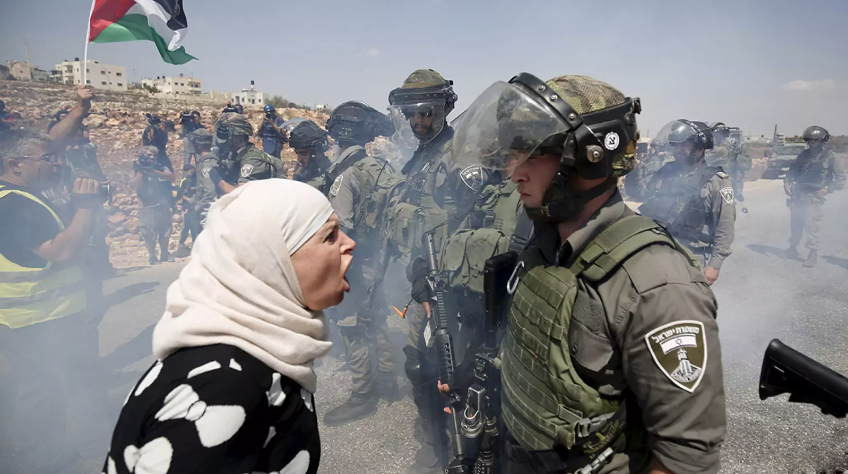Bombs do not kill ideology but inflame it, writes DOUGLAS RASBASH
There, in the heart of world monotheism, a place that many have called The Holy Land, people are killing each other in their thousands – as they have done for millennia.
Atheists can surely be forgiven for gloating at the obvious failures of religions yet again. No wonder religious leaders are anxiously imploring the factions to cease fire and work towards peace. The perpetual violence is an embarrassment to all religious dogma, whether Muslim, Jew of Christian. Inevitably the warring factions invoke the one God as being on their side in a just and holy war.
As the Arab world funds and supports directly and indirectly the Palestinian position, so generally the Judeo-Christian world supports Israel. The atheists of China and Russia, having no particular axe to grind, simply demand it to unconditionally stop, and are very right.
The Middle East has long been a region plagued by conflict and turmoil. The complexities of its political, religious, and ethnic tensions have given rise to a seemingly never-ending cycle of violence and instability.
In this essay, we will explore why guns can never provide a solution to the Middle East and why they often exacerbate the problems rather than solving them. This ongoing conflict is indeed an unholy war, and it requires alternative approaches to achieve lasting peace and stability.
Existing tensions
The Middle East’s turbulent history is a testament to the ineffectiveness of guns in resolving its issues. The conflicts in the region date back centuries and have evolved into multifaceted, deeply-rooted problems that cannot be addressed by simple military solutions. From the Israeli-Palestinian conflict to sectarian strife in Iraq, the region’s problems are deeply embedded in history, culture, and religion.
The introduction of guns and modern weaponry into the Middle East has only served to escalate the violence and deepen the divisions. Rather than acting as a stabilising force, these weapons have often been used to exacerbate existing tensions. The proliferation of arms in the region has made conflicts deadlier and more difficult to resolve. It has fuelled a never-ending arms race that only benefits arms dealers and perpetuates suffering among the populations.
One of the most tragic consequences of relying on guns to address Middle East conflicts is the immense civilian suffering it has caused. Innocent men, women and children bear the brunt of the violence, displacement, and economic devastation. The indiscriminate nature of modern warfare means that civilians are disproportionately affected, leaving entire communities in ruins.
The overreliance on military force has consistently undermined diplomatic and political solutions. Negotiations, peace talks, and diplomacy have been overshadowed by the power of guns, leading to a persistent stalemate in the region. Guns tend to perpetuate a zero-sum mentality where one side’s gain is seen as the other’s loss, making it difficult to achieve mutually beneficial agreements. Guns have contributed to cycles of retaliation that seem endless.
cycle of revenge and hostility
When one side resorts to violence, it often triggers a response from the other, perpetuating a cycle of revenge and hostility. The result is an unholy war with no end in sight as parties become increasingly entrenched in their positions and distrust deepens. The Middle East conflict has attracted international involvement, with global powers often using the region as a proxy for their own interests. The presence of guns and military support from various nations has complicated the situation further. Rather than promoting stability and peace, these external influences have often exacerbated existing problems.
Given the ongoing suffering in the Middle East, there is an urgent moral imperative to seek alternative solutions. Relying on guns as a means of resolving these conflicts is not only ineffective but also inhumane. The world must prioritise the well-being of Middle Eastern populations and work toward lasting peace.
Turning the pages of history back to 1940s Germany applies the same tactics of incarcerating huge numbers of Jews in the Warsaw Ghetto – breaking every rule in the book of human rights – and exterminating them. So it is with Israel and the Palestinians. Such violence can never provide a basis for peace in the Middle East and can only inflame Palestinian Ideology. The region’s complex history, deep-rooted tensions, and the humanitarian imperative make it clear that alternative approaches are necessary to break the cycle of violence and establish lasting peace.
Ideology of freedom
The ongoing conflicts in the Middle East are indeed unholy wars, and it is incumbent upon the international community to support diplomatic, political, and humanitarian solutions that prioritise the well-being and future of the people in the region. Only by focusing on dialogue, cooperation, and reconciliation can the Middle East begin to heal and move towards a more stable and prosperous future.
While bombs may destroy their homes and many lives, it cannot and will never destroy the ideology of freedom, opportunity and decent life free of oppression, exactly as the Zionists had a few generations ago. There is a much that Botswana can do: 1) Set aside the unwritten policy of non-interference on global issues and in particular conflict; 2) Promote the nation as a pre-eminently peaceful one, understanding what it takes to resolve conflicts and build peace; and 3) Establish a UNU campus in Botswana responsible global conflict studies and resolution – specialising in the Southern Hemisphere.
Such would elevate the status of Botswana in the eyes of the world. Let us stand up and be counted – this is a very unholy war and it must stop.

